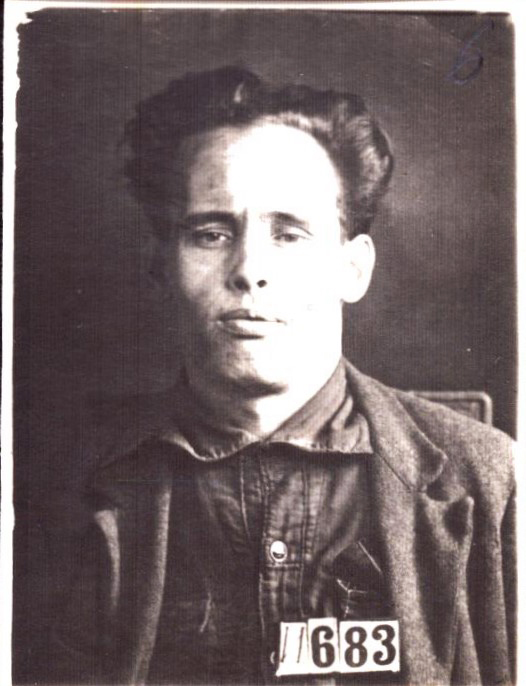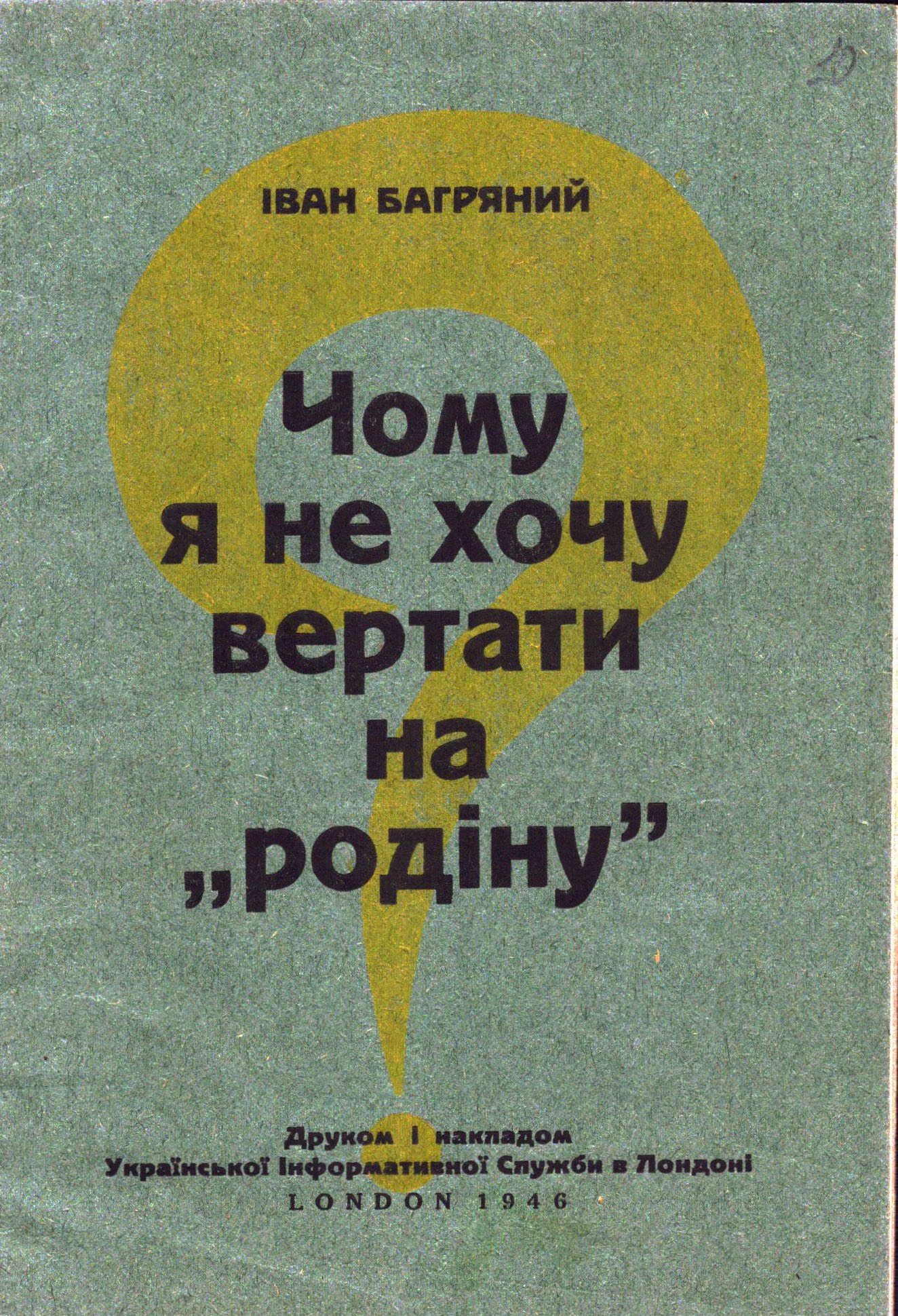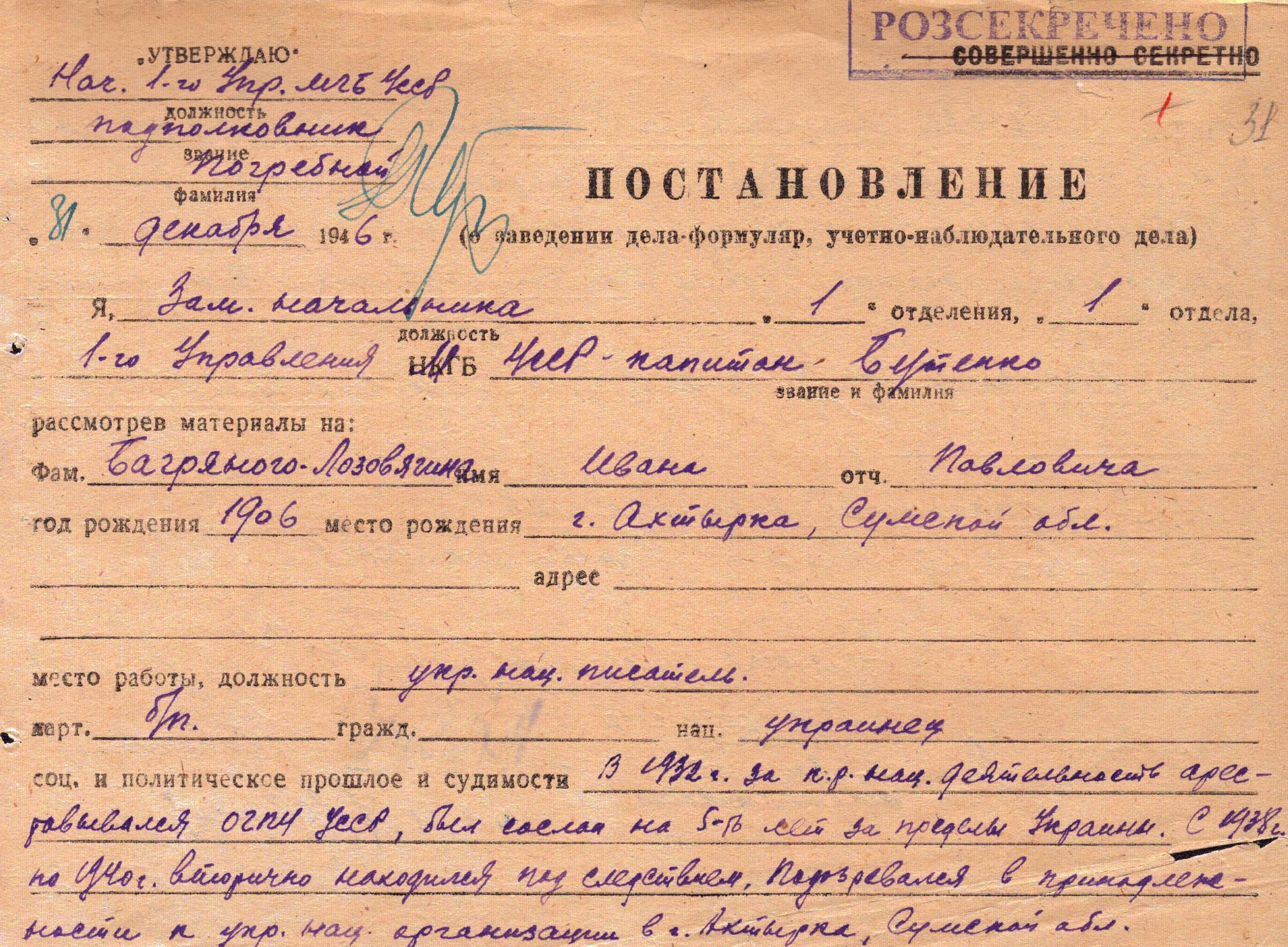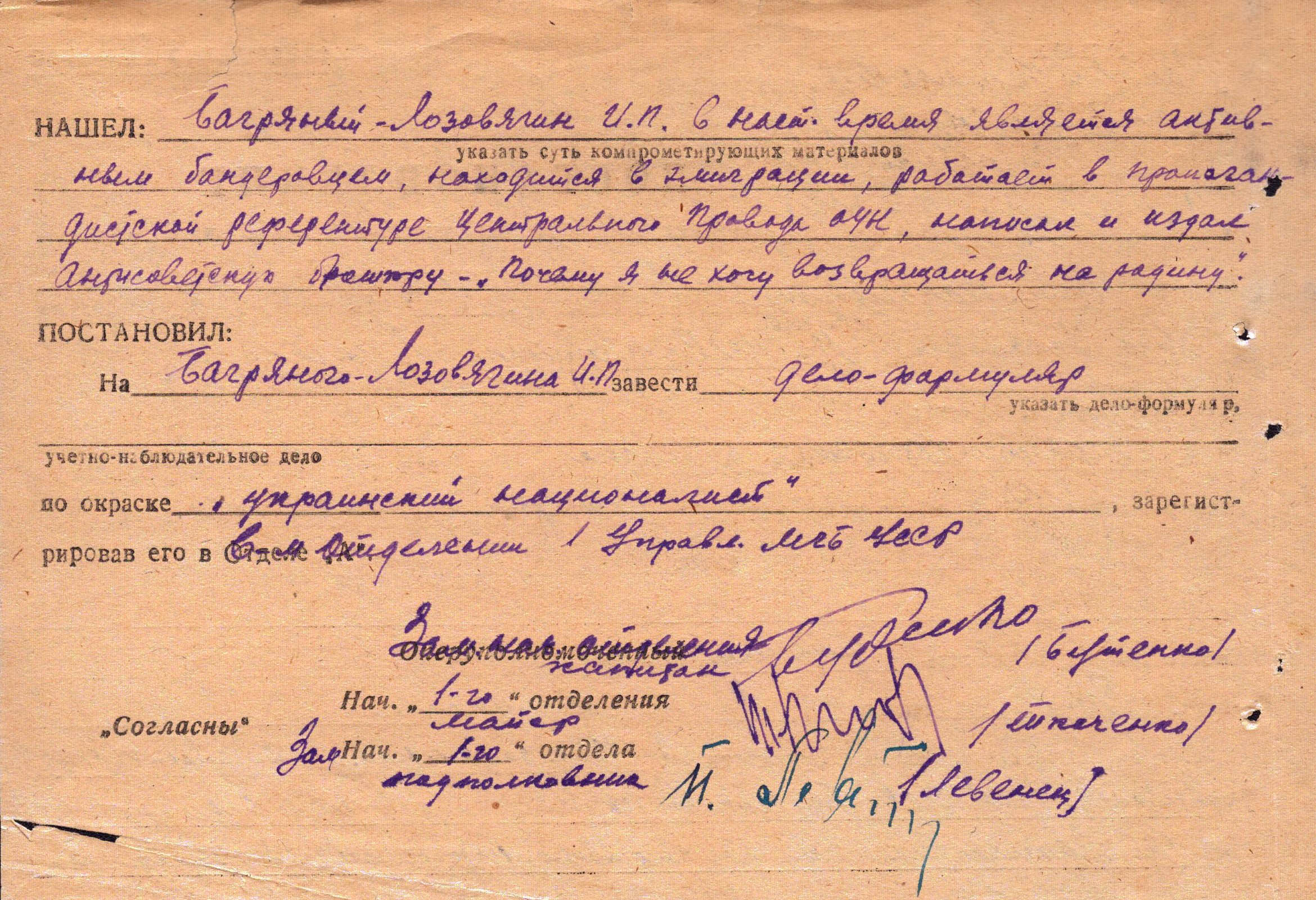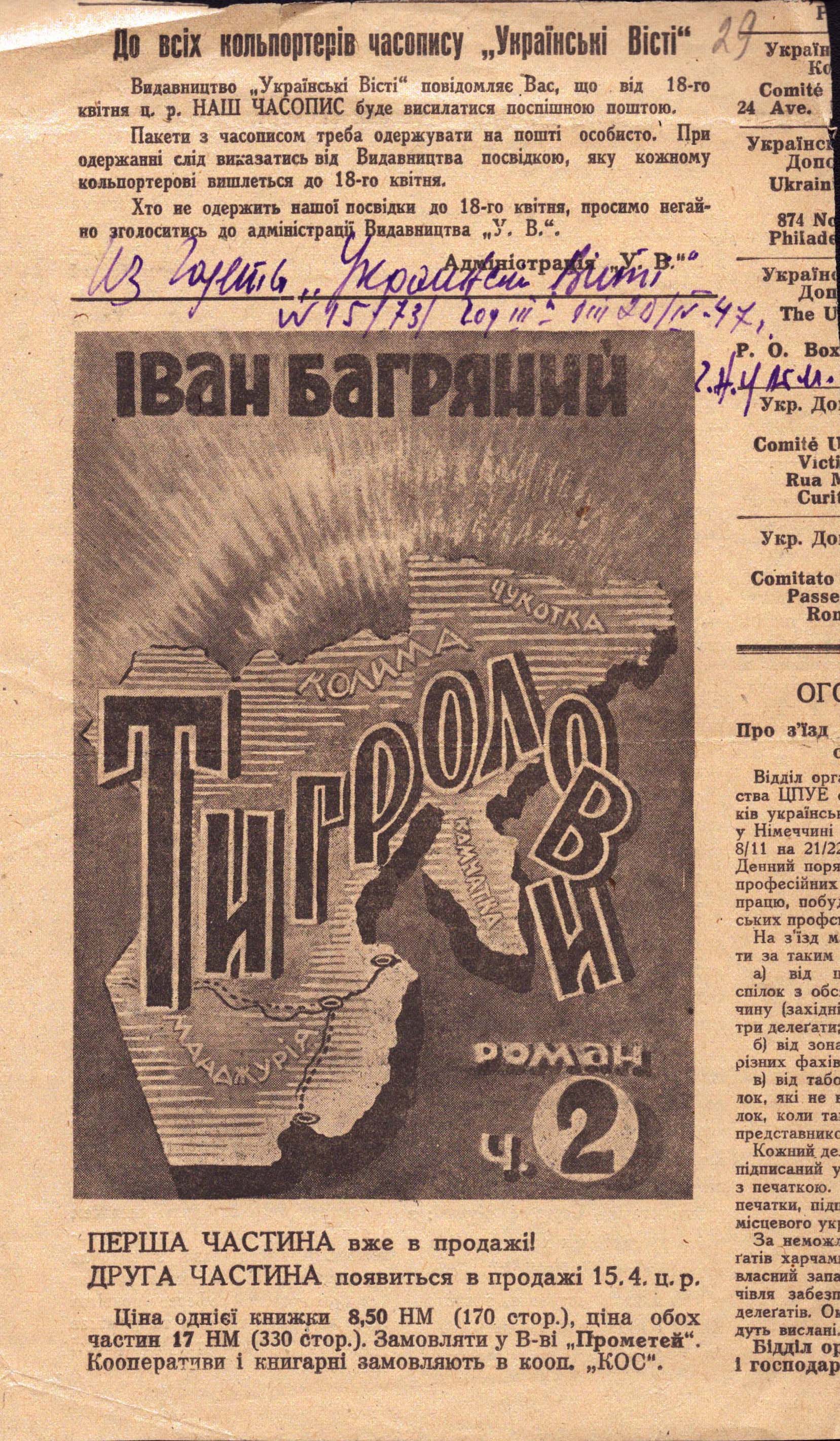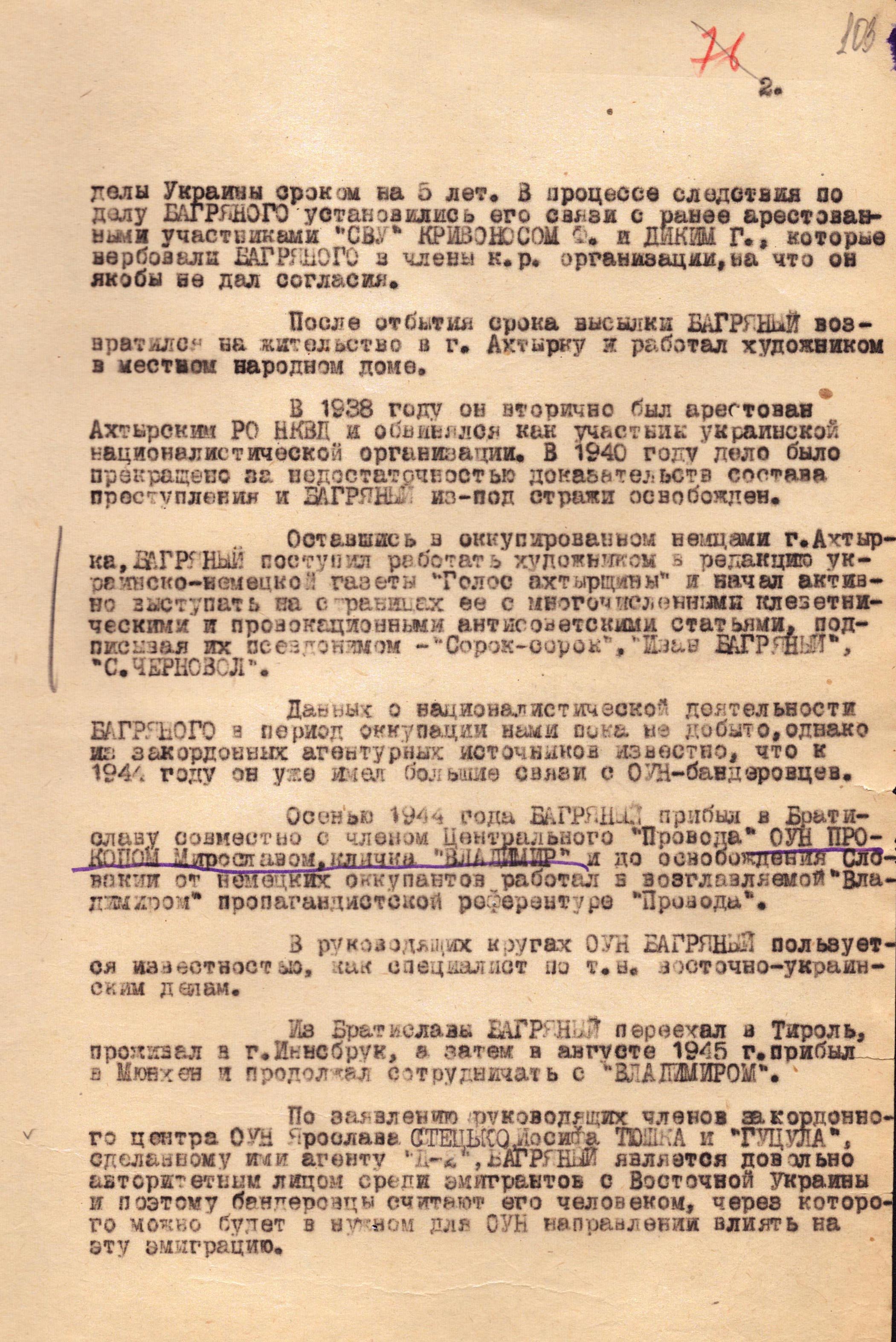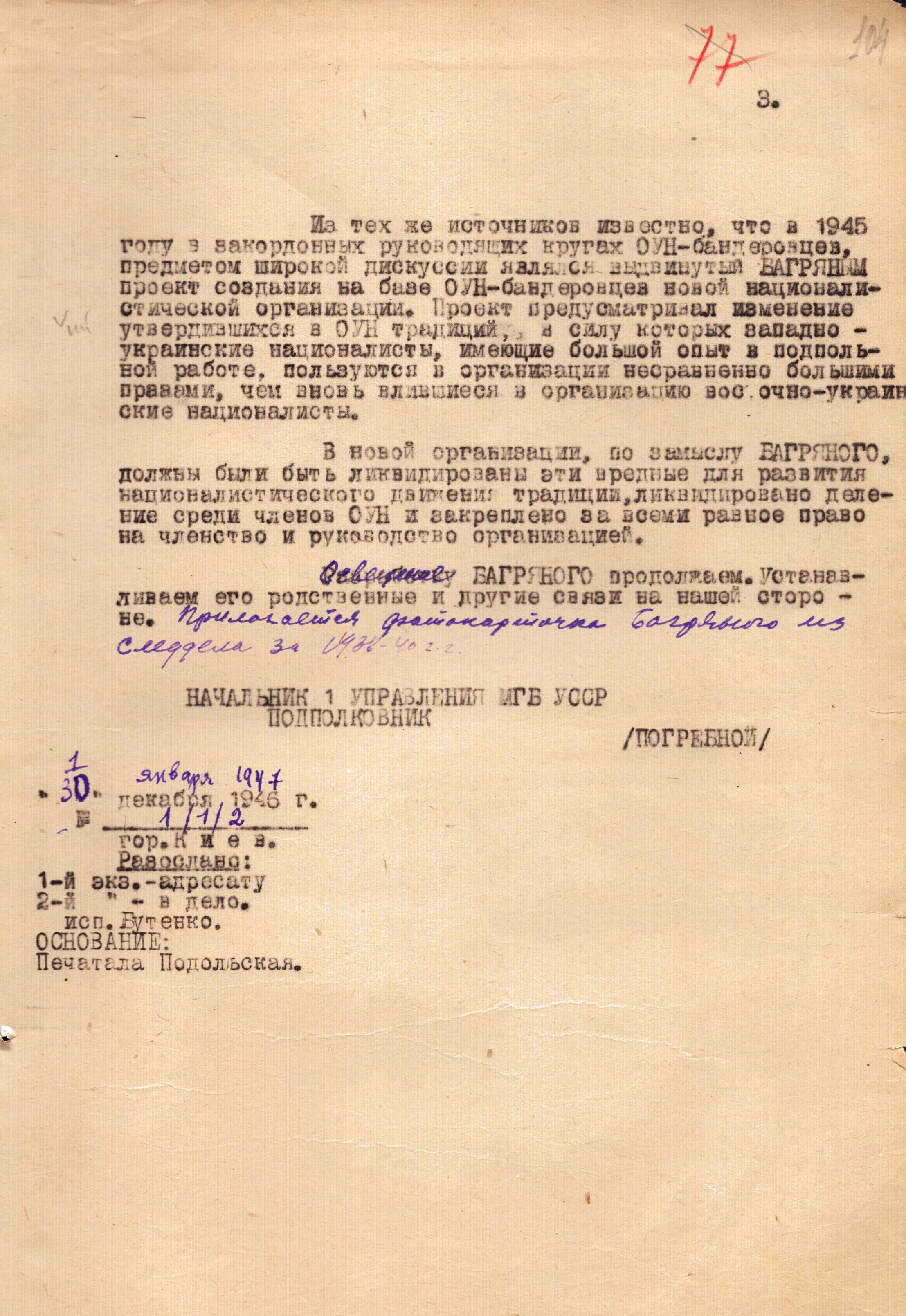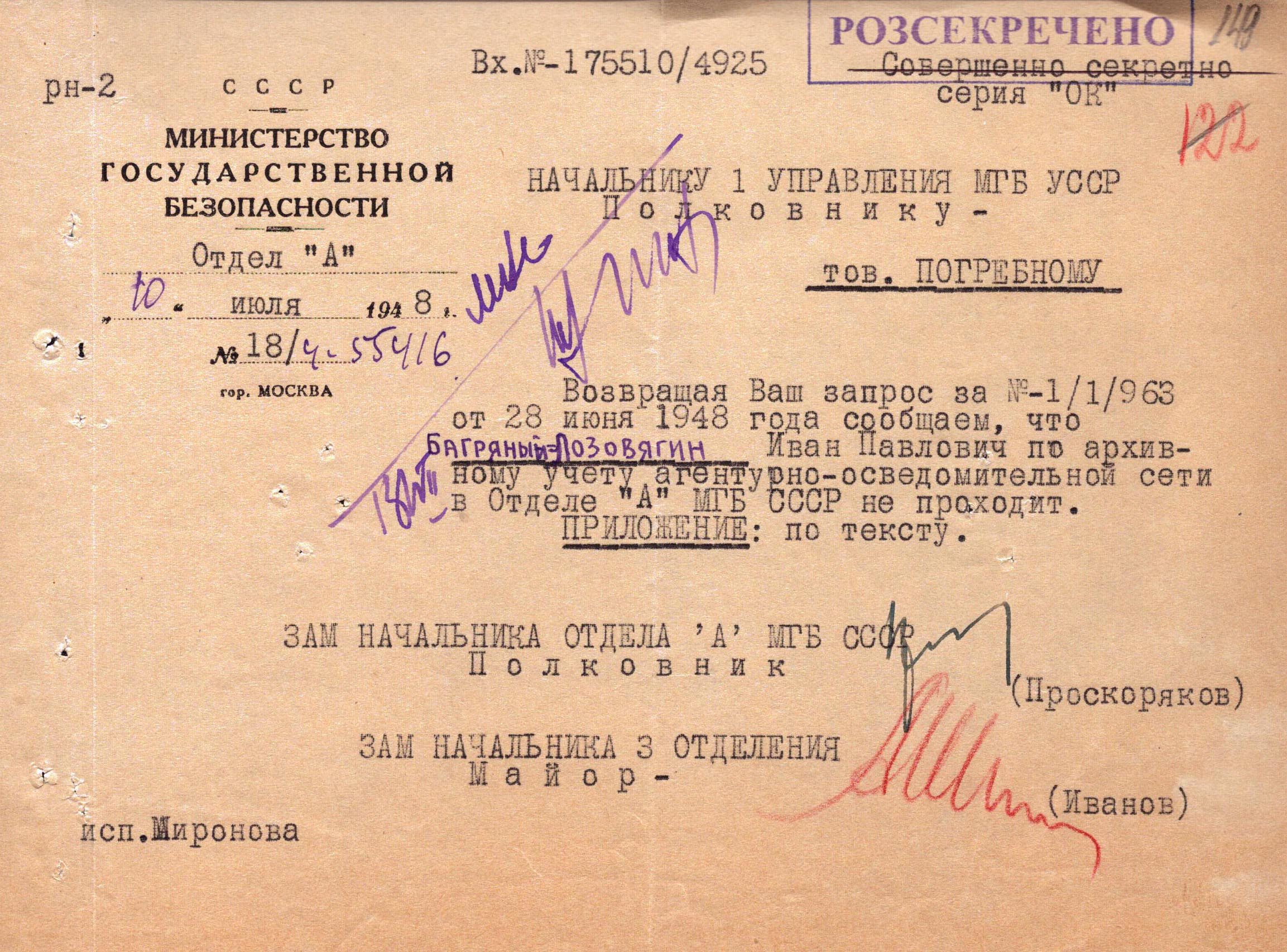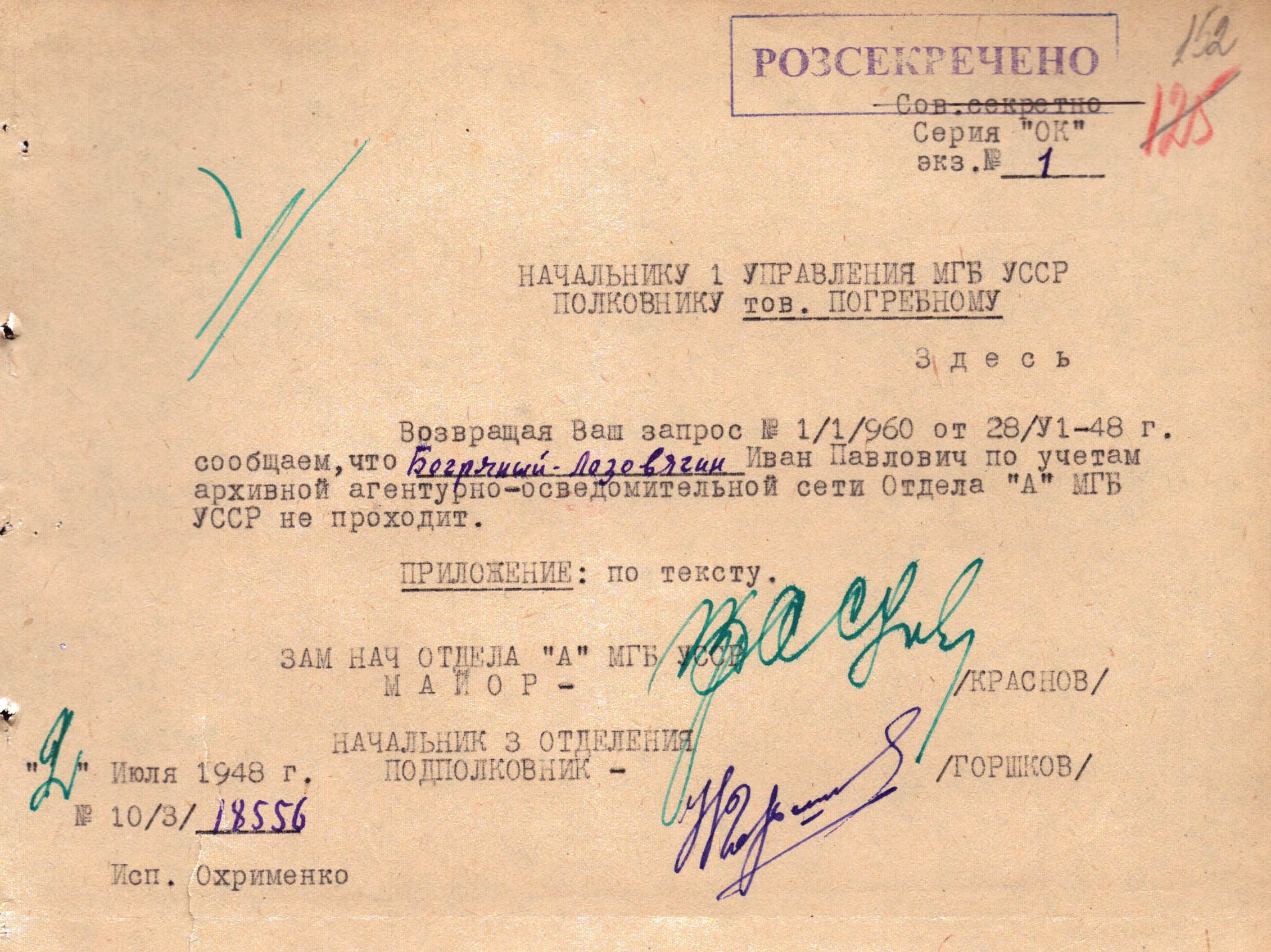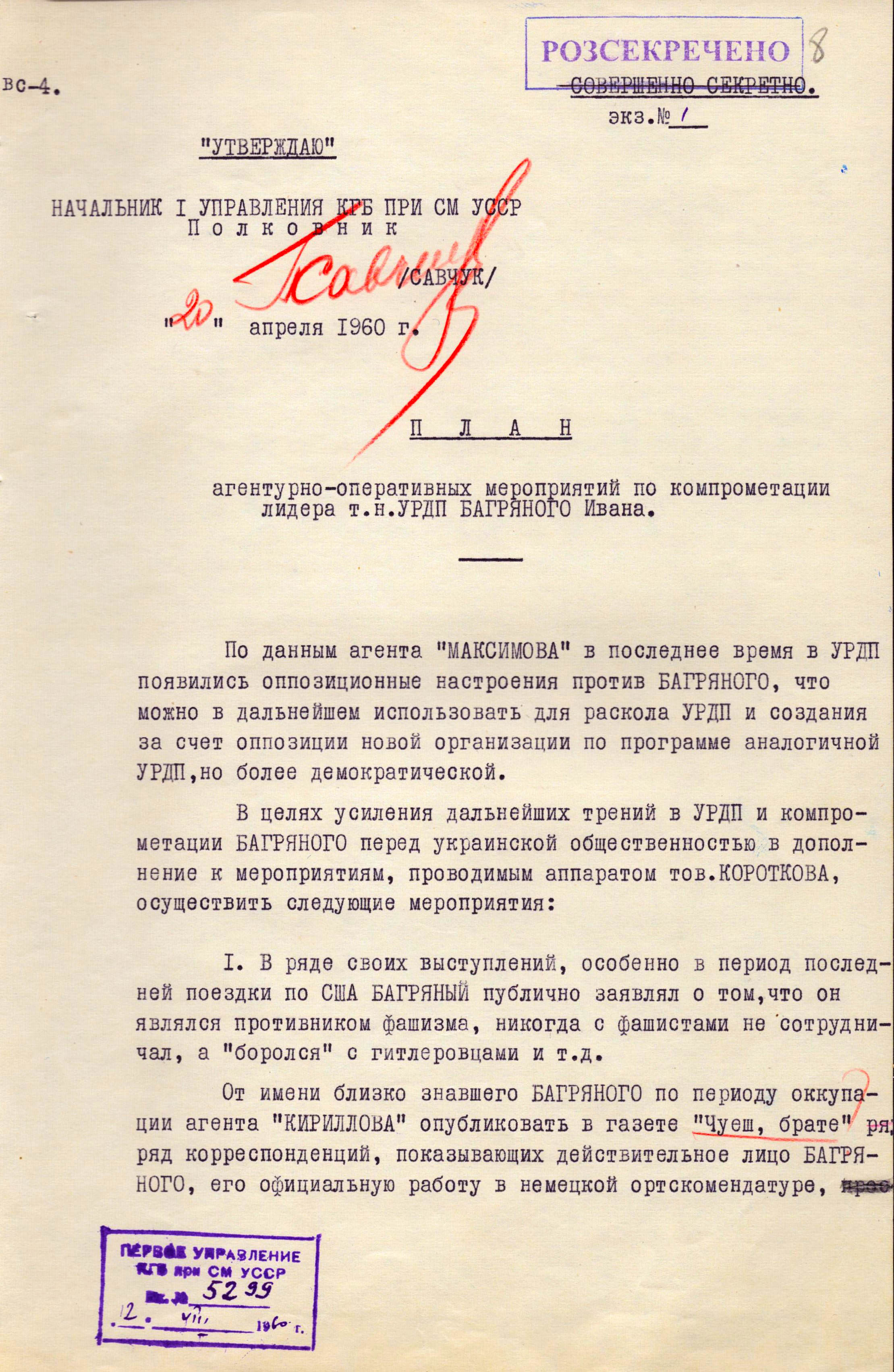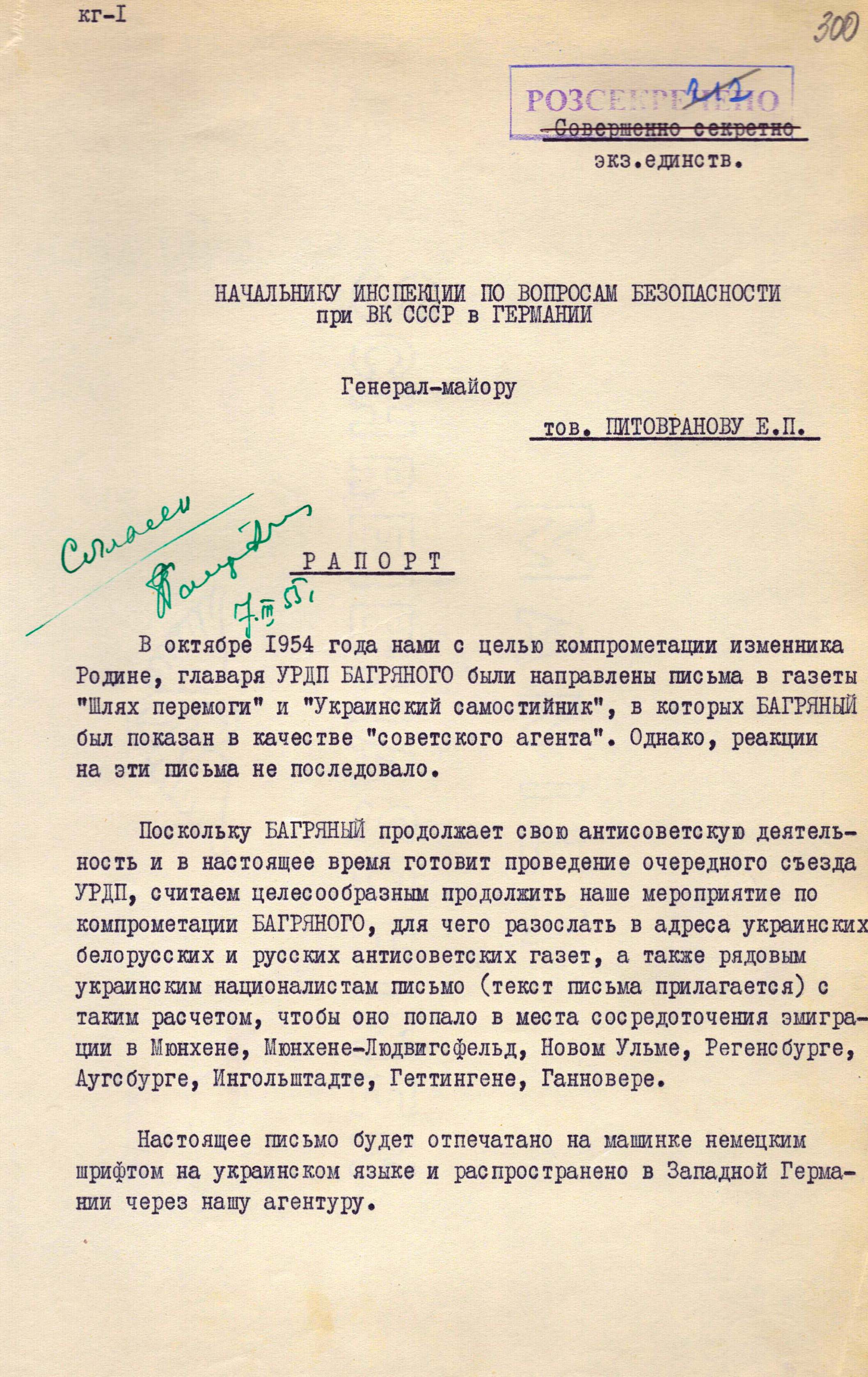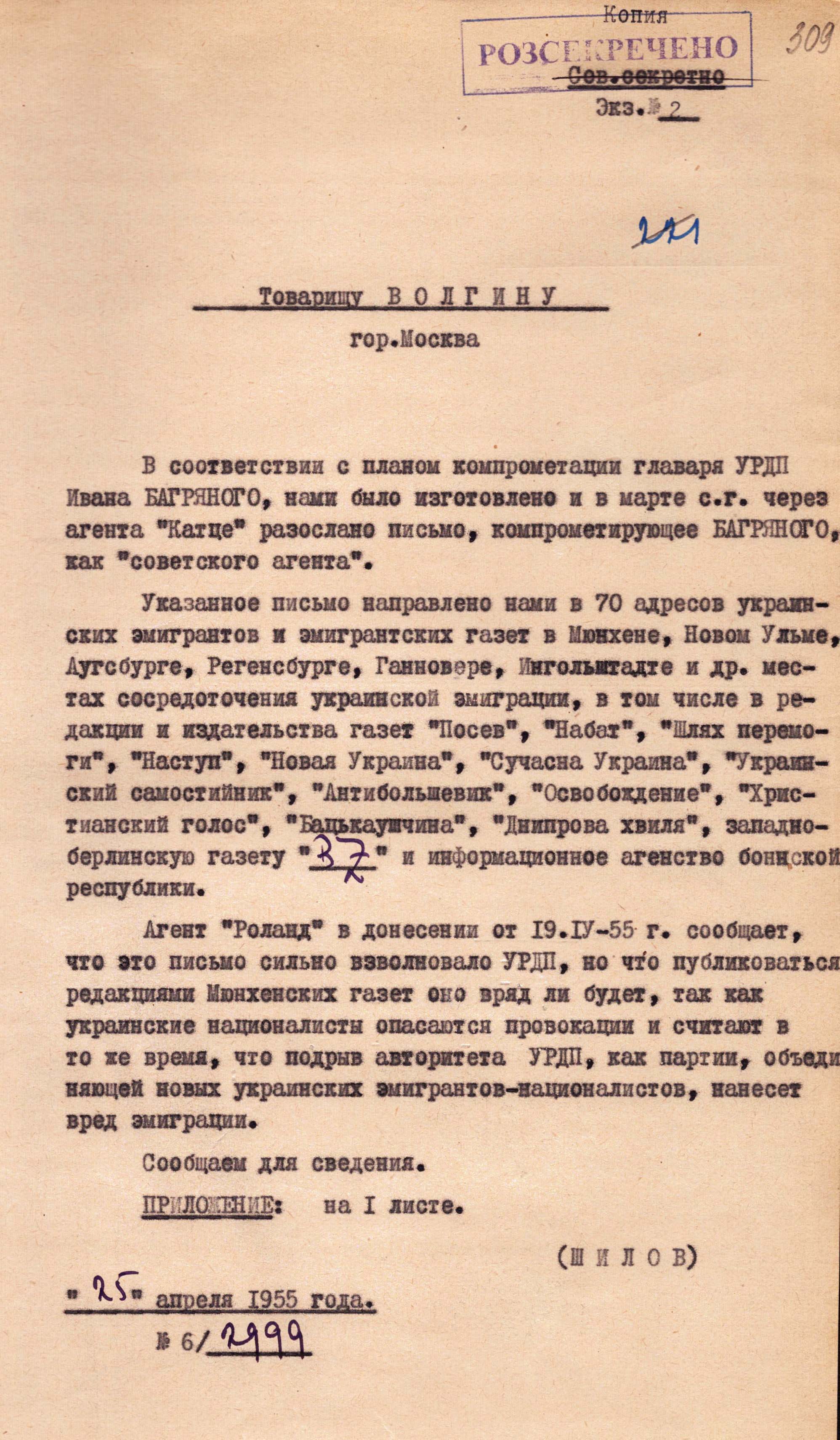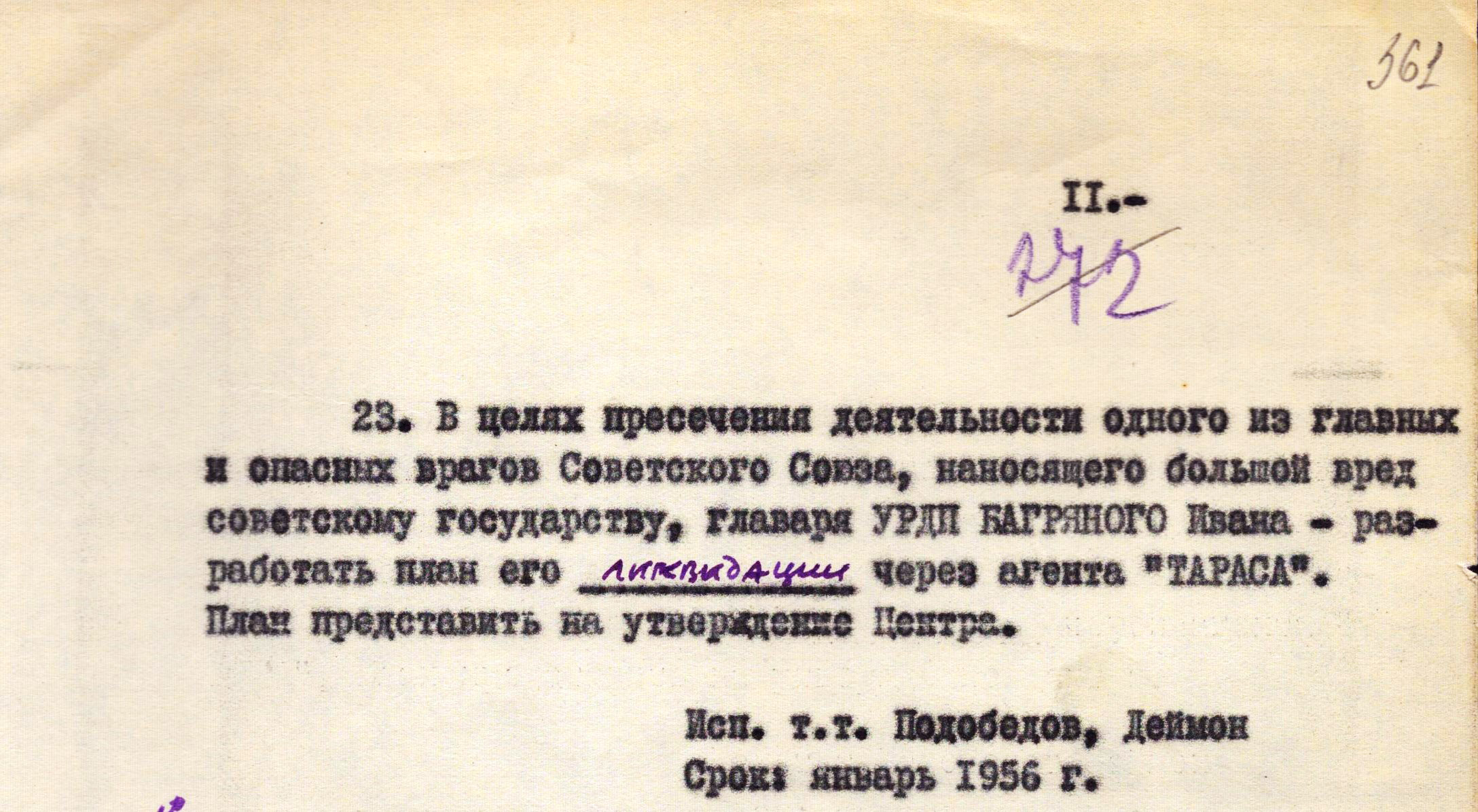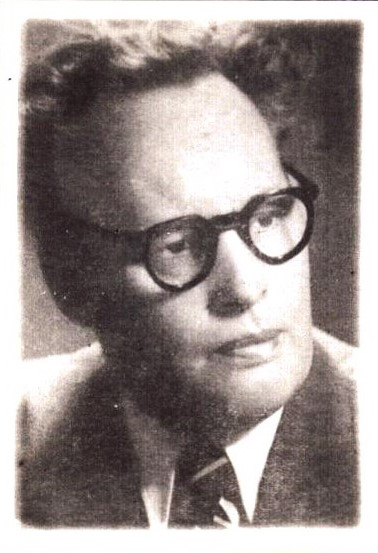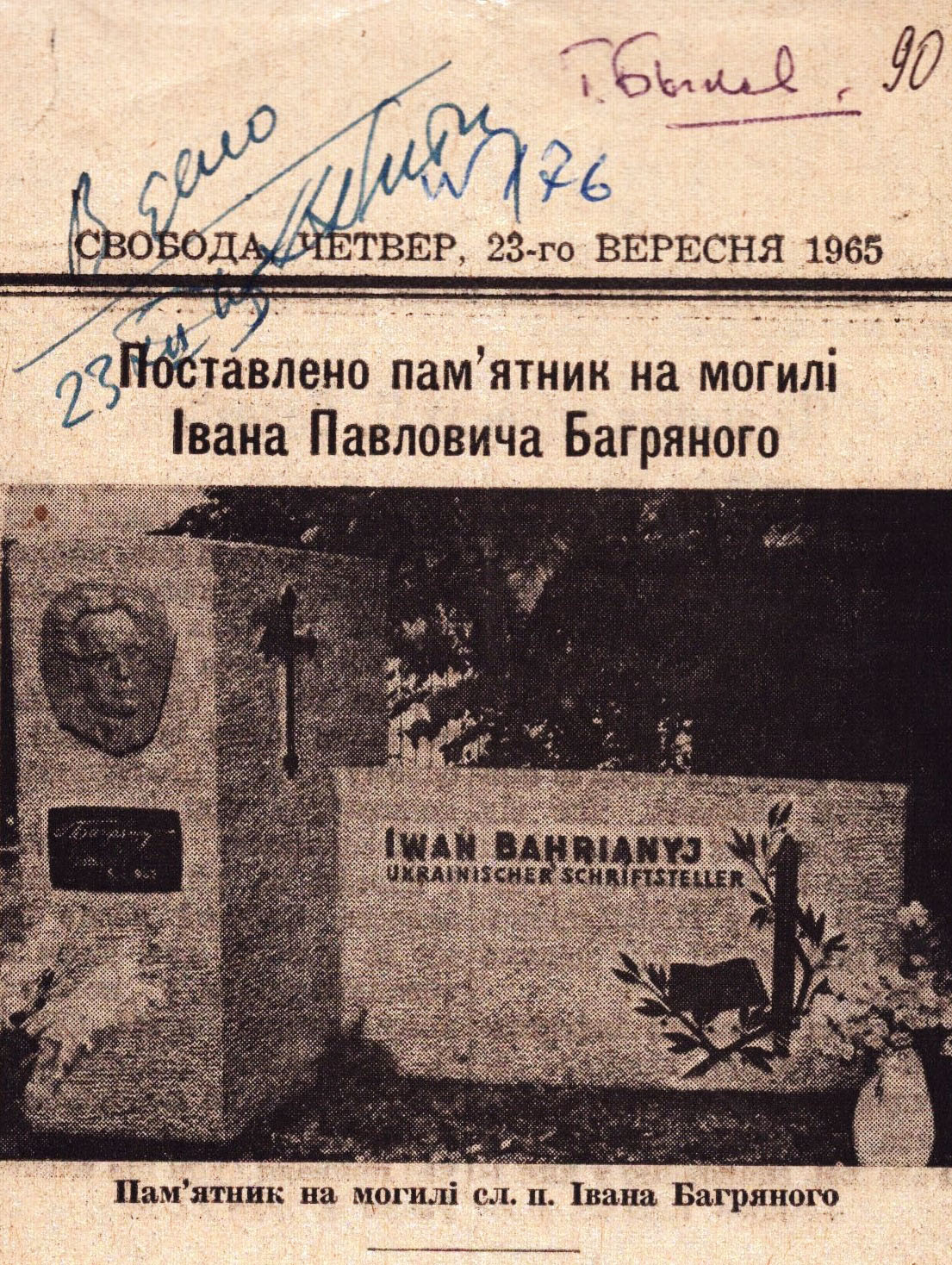How the KGB Tried to Turn Ivan Bahrianyi into Ivan “Red”
4/10/2024
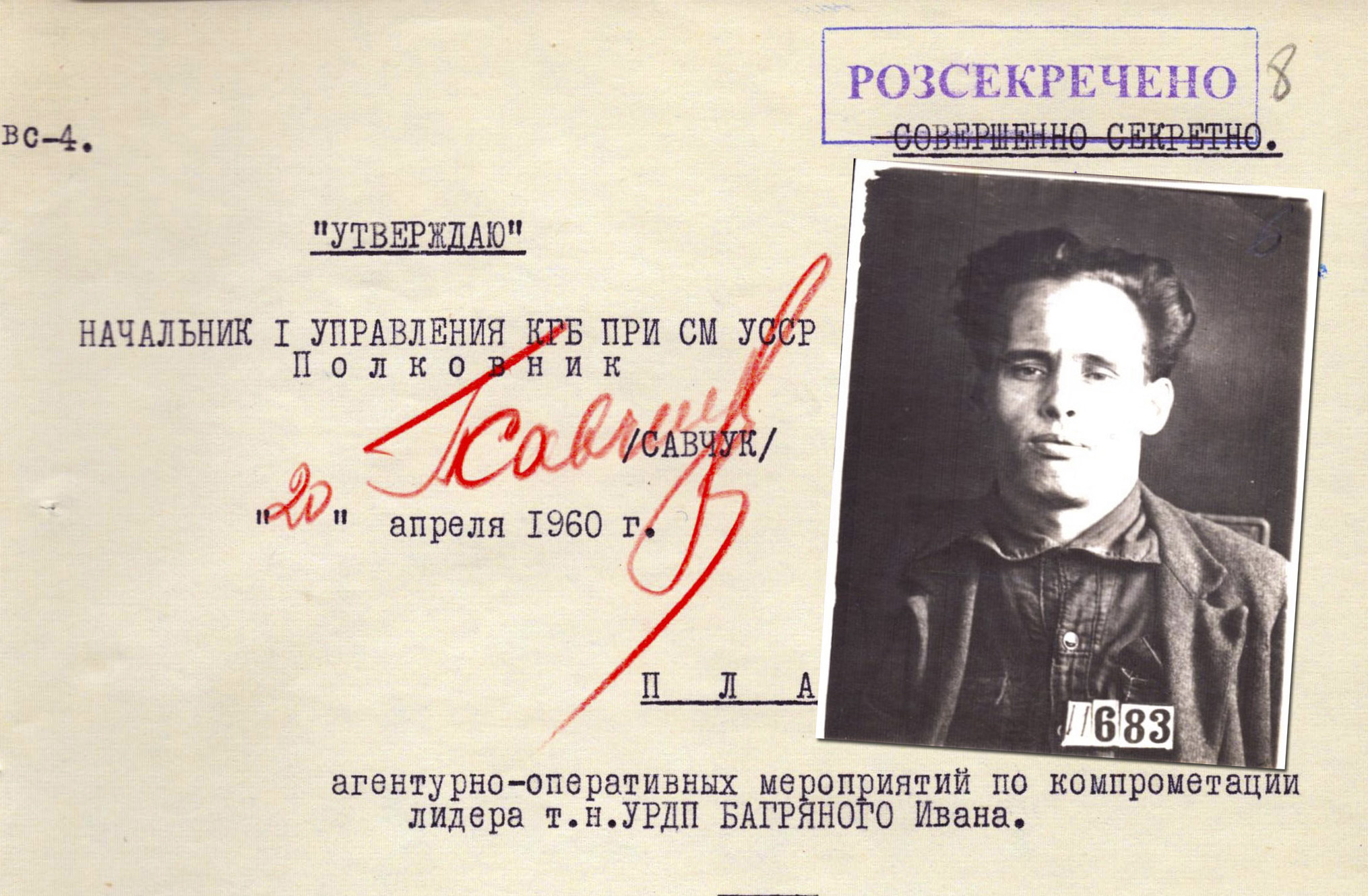
In the archival funds of the Foreign Intelligence Service of Ukraine, documents were found that shed light on how, in the 1950s and 1960s, the mgb/kgb of the ussr tried to persuade Ukrainian cultural, scientific and literary figures in exile to cooperate, abandon anti-soviet activities, and return to the soviet union and in case of failure, measures were developed to compromise or even liquidate them. One of the objects of such operational cultivation was the famous political figure and writer Ivan Bahrianyi (bahrianyi in Ukrainian means purple- Transl.).
“Why I Don't Want to Return to the “motherland”
In September 1946, a package arrived in Kyiv from moscow, from the first main directorate of the mgb of the ussr, the contents of which showed that a new case would have to be opened immediately. The package contained a brochure entitled eloquently – “Why I Don't Want to Return to the “motherland”, written by Ivan Bahrianyi, a photo of the author and clippings from the newspaper “Ukrainski Visti” edited by him abroad, with excerpts from the novel “Tyhrolovy” (“Tiger Trappers”, published in English as “The Hunters and the Hunted”–Transl.) and other articles. In the accompanying document, the brochure was called anti-soviet, and its author – a Ukrainian nationalist staying in the American occupation zone of Germany. Information was requested on I. Bahrianyi and his relatives.
The analysis of the brochure's content, carried out in the mgb of the ussr, proved that its author did not just stand on anti-soviet positions, but was a dangerous enemy of the soviet power. It was a kind of pamphlet explaining to the Western public what happened under soviet power in the interwar years and why many citizens of the ussr did not want to return to the “stalin camp”: the artificial famine that took the lives of millions of Ukrainians, anti-religious campaigns, and the destruction of the clergy and the Ukrainian intelligentsia, which was “tortured in such a way that even Hitler could envy and learn”.
“I will return to my Motherland”, the pamphlet read, “with millions of my brothers and sisters, who are here in Europe and there in Siberian concentration camps, when the totalitarian bolshevik system is demolished like Hitler's one”. When the nkvd goes after the Gestapo, when the red russian fascism disappears like the German fascism did. When the right to freedom and independence are returned to us – the Ukrainian People – in the name of Christianity and justice”.
The chekists meticulously studied the text with a pencil in hand. Some phrases were underlined. For example: “That's why I hate bolshevism and don't want to return to the “motherland”. Or this sentence: “This is why I do not want to return under bolshevism and will never let them take me alive...” There are also remarks in the text where I. Bahrianyi gave some information about himself: that he is 35 years old, that “ had served a third of my life in soviet prisons and concentration camps back before the war”. And how in 1920 his 92-year-old grandfather, a one-armed cripple, was murdered by the chekists in front of him for being a wealthy peasant and opposing the “commune”, and his uncle – for being a “soldier of the national Army of the Ukrainian People's Republic. For his fighting for freedom and independence of the Ukrainian People”.
Biographical information from the pamphlet made it possible to quickly identify the author and collect all the necessary information about him. Soon a reply was sent to moscow, which informed in detail who had dared to speak publicly against the policy of the ussr. By then the pamphlet had already gained an unheard spreading. It could be bought in many kiosks and bookshops. The text was translated into English, German, Spanish and Dutch.
A document of the ussr mgb reported that Ivan Pavlovych Bahrianyi-Lozoviahin, born in 1906, a native of Okhtyrka, Sumy region, a writer by profession, in 1926 through 1928 was a student of the Kyiv Institute of Arts. Wrote and published “nationalistic, clearly counter-revolutionary” works “Tin’” “Vandeia”, “Gutenberg”, “Batih”, “Ave Maria”, “Skelka” and others.
“On April 16, 1932”, the document continued, “Bahrianyi was arrested for his nationalistic activities and, by decision of the special meeting of the collegium of the ogpu of the Ukrainian ssr and exiled from Ukraine for 5 years... Having served the term of exile, Bahrianyi returned to live in Okhtyrka and worked as an artist in the local people's house. In 1938, he was arrested again by the Okhtyrka district department of the nkvd and accused of being a member of a Ukrainian nationalist organization. In 1940, the case was closed due to insufficient evidence of a crime, and Bahrianyi was released from custody”. (BSA of the SZR of Ukraine, F.1, Case 10812, V.1, P. 102-104).
The document also pointed out that I. Bahrianyi worked for the newspaper “Holos Okhtyrshchyny” during the Second World War, then moved to Western Ukraine, where he established contacts with the OUN. After the war, he found himself in emigration, first in Augsburg, then in Neu Ulm, worked in the propaganda office of the OUN Provid, advocated changing the established traditions of the Organization and granting new members broader rights. Therefore, on December 31, 1946, on the basis of the collected materials, the mgb of the soviet Ukraine opened a case-form marked “Ukrainian Nationalist” on I. P. Bahrianyi -Lozovyahin.
An Uninvited Guest from Ukraine
Having opened the case, the chekists began to collect information on I. Bahrianyi's close relatives and acquaintances who lived on the territory of the Ukrainian ssr, and about his being under investigation. They wanted to know how he behaved during the arrests and in exile, whether he cooperated with the investigation and other details that might be needed in operational cultivation. Autobiographical works that were published abroad and were a great success, mentioned that the main character did not sign any confessions.
Instead, the chekists found in the archives the first investigative case against I. Bahrianyi and confessions allegedly written by him. In particular, he allegedly admitted that for a long time he had been spreading counter-revolutionary views among his environment in Kyiv and Kharkiv, as well as among red army servicemen he was acquainted with. Here is an excerpt from his confession:
“In 1928, I moved to Kharkiv and had the following convictions:
1. I must work first of all for Ukrainian culture and my books should be national not only in form, but also in content.
2. National policy is conducted in a wrong way... russian culture is given preference and better conditions are created for it, and russian culture dominates at our expense. We depend on it.
3. In our cultural development, we need to focus on Europe, not on moscow.
4. Very tight limits have been created for Ukrainian culture... I wanted to write, publish and promote my views and attitudes to the masses. My mission is to remain a Ukrainian writer to the end, awakening “national consciousness” with my works”. (BSA of the SZR of Ukraine. – F.1. – Case 10812. – V. 1. – P. 54).
But that was not exactly what they were trying to find. In terms of content, that was a defiant challenge to stalin's national policy. They were looking for confirmation of some kind of remorse, agreement to cooperate, atonement. This would often be obtained from the arrested with the help of torture and intimidation. Therefore, inquiries were sent to the central apparatus of the mgb of the ussr in moscow, to Kharkiv, where he was kept in prison, and to the place of administrative exile. A reply was received from moscow that “Bahrianyi-Lozoviahin Ivan Pavlovych is not registrated in the intelligence network of the mgb of the ussr”. The same answer was received from the relevant bodies and units of the ussr mgb, from omsk, novosibirsk, and khabarovsk. They could not find a single agent case against him.
At the same time, this did not stand in the way of the implementation of the operational plan, which had already matured in the bowels of the mgb of the ussr. According to the plan, a relative or a close acquaintance of I. Bahrianyi had to be found and sent abroad with a special task. The task was to persuade Bahrianyi to abandon his anti-soviet activities and to cooperate with the mgb. It was planned to give him a letter from I. Bahrianyi’s wife, who lived with their son and daughter in Okhtyrka, and a photo of them together, so that it would encourage Ivan to make the “right” decision and further create the conditions for his return to the ussr. In addition, the “courier” had to be “armed” with compromising materials in case if the offer is rejected. Plan “B” was also developed...
Bahrianyi’s distant relative and long-time acquaintance from the time when they lived together in Okhtyrka and were in the ranks of the OUN was chosen for the role of courier. He had just returned to the ussr from Germany, where he had been taken by the Nazis for forced labor, and after the war he worked there for almost three years in a sewing workshop at a soviet military unit. According to the legend, he was given the operational codename “Dolia”, first was sent to Berlin, and then was employed as a storekeeper at a German factory near the border with Western Germany. He lived and worked there for nine months, after which he received an assignment to illegally cross the border, get to the city of Neu Ulm, find I. Bahrianyi, and meet with him.
Their meeting took place in October 1952. At that time, I. Bahrianyi was the leader of the Ukrainian Revolutionary Democratic Party (URDP), which he founded, and the editor of the newspaper “Ukrainski Visti” – the printed organ of the party. In addition, he was the head of the executive body of the Ukrainian National Rada (UNRada) and Deputy President of the UPR in exile. In archival documents, the URDP was considered one of the most active anti-soviet organizations with a fairly extensive network. Regarding its political direction, the chekists pointed out that the party “first adhered to the Bandera ideology, then entered into an alliance with the Melnikites, after which it joined the Ukrainian socialists and eventually headed the “democratic bloc”.
Despite such vacillations, the URDP’s goal was independence of Ukraine, and this made it subject to the mgb's operational efforts. And the party leader, despite his political activity, also had the reputation of a talented writer. He had already published abroad his novels “Tyhrolovy” (published in English as “The Hunters and the Hunted”), “Sad Hetsymanskyi” (Garden of Gethsemane”) and other works that showed the criminal nature of the stalinist regime and its repressive system. Such an active figure could not be ignored.
“Dolia” had all the necessary information about I. Bahrianyi. He turned up at his flat in the evening. When asked how he ended up there, he admitted that he was sent from moscow. The description of this and other meetings in archival documents makes it possible to understand how the mgb, with the help of its methods, would persuade a certain person to its side.
“Dolia”, without a long introduction, told I. Bahrianyi straight away ( as he was told to), that in moscow they supposedly remember his cooperation with the soviet authorities during the investigation and therefore want him to agree to cooperate in the new conditions. And after that, he was supposed to be given the opportunity to return to his homeland. To this, I. Bahrianyi, as evidenced by the documents, resolutely declared that he did not cooperate with anyone and that all this was simply made up.
“Dolia” advised not to rush to conclusions. He said that in moscow they know about the great talent of I. Bahrianyi, and that he could become a laureate of the stalin prize in the ussr with his abilities. But first he must report on the activities of his party and, in general, on the plans and intentions of the figures of the Ukrainian emigration, with whom he was acquainted. “It is an honorable job”, “Dolia” pointed out, following the instructions, “to be a representative of the soviet government in the camp of its enemies and to warn in a timely manner about the plans of the enemies. They allow you even for the time being to remain in the role in which you are now, to write in the same spirit in the newspapers, to make the same speeches and to behave in the same way as outlined by your plans. But all this must be reported in a timely manner”.
“I won't do that”, answered I. Bahrianyi. “If you return to them, tell them that Ivan Pavlovych will not engage in minor snitching, he has more important things to do – namely, the fate of the Ukrainian people...” (BSA of the SZR of Ukraine. - F.1. – Case 10812. - V. 3. – P. 170–172).
After that, “Dolia” handed over the letter from Ivan’s wife and the photo. According to archival documents, I. Bahrianyi read it silently, went to another room and coughed, after which blood flowed from his mouth. To this he explained that his lungs were sick, he had already had one operation, but another one was needed. And then he sadly added: “It turns out that they are also torturing my wife there because of me”.
At the end of the conversation, I. Bahrianyi advised his relative to hide from his mgb supervisors in the West, find a job, and get married. But the latter replied that they would find him anyway, no matter where he hid, and besides, they would harass his family. So he decided to come back and report on the fulfillment of the task. But the result did not satisfy his curators from the mgb. Therefore, at the end of February 1953, he was again sent to Neu Ulm.
This time I. Bahrianyi met him not that kindly. He said that after the previous visit, he told about all these demands to his closest circle. Therefore, they took additional measures and increased security in order to protect themselves from such guests. And he did not turn to the police solely because he was sorry for his relative who fell into the sinister traps of the chekists.
“Dolia” complained that he was a slave and that he was sent again with the same task. He voiced the chekists’s conditions to I. Bahrianyi: the need to atone for his guilt before the soviet authorities, repent, correct his mistakes, agree to cooperation, which will allow him to return to his homeland and continue to “live honestly and work for the benefit of the Ukrainian people”. At this, he handed over a new letter from Ivan’s wife and another letter written in the mgb.
“We are aware”, the letter said, “that you are an open enemy of the soviet union, and if you were to fall into the hands of the soviet authorities today, you would undoubtedly be sentenced.
But it would be wrong on your part to think that through this letter, through establishing contact with you, we seek to achieve some selfish or insidious goal. Believe that by spending so much time, energy and means to establish contact with you as our confidant, we are certainly not interested in depriving you of your freedom now or sometime in the future, but on the contrary, (we are interested) in keeping you for as long as possible in that environment in which you are now. At this, we offer you not a role of a “minor snitch”, as you put it, but a noble and honorable role of a representative of the great soviet union in the state of its enemies.
And here you should believe the sincerity of our words, that if you accept our proposals and treat them honestly, no matter how long you have been in the state of the enemy – for a year or for five years – if you need to seek protection or a hiding place, you will always be accepted in your Motherland as a person who has earned the right to forgiveness, to a calm and secure life and fruitful work” (BSA of the SZR of Ukraine. - F.1. - Case 10812. - Vol. 5. – P. 70-71).
“Doliya” handed over the letters and agreed to meet the next day. They met on March 6, 1953. According to the documentary report, I. Bahrianyi entered the beer bar in a high mood and immediately said: “Well, is it all over?”. And as the relative did not understand anything, he added: “stalin died, and therefore the things change... Now significant political events will take place. There, in the kremlin, they will fight for power. There will be a revolution in the ussr. America will take advantage of this situation, this discord. There will be a war. And we will have an opportunity to come to power...” (BSA of the SZR of Ukraine. - F.1. - Case 10812. - Vol. 3. - P. 202).
Eventually, as testified by archival documents, after this and the following meetings, which took place under the supervision of security service employees of the URDP, I. Bahrianyi again offered his acquaintance to stay in the West. In case of disagreement, he advised to tell everything as it was after returning. At this, to add that the party has powerful intelligence. Therefore, it is better not to make repeated attempts to send someone, because they will be detained, as it happened to two persons, who were recently sent to meet with members of the Ukrainian government in exile, but they were exposed.
And in conclusion he added: “Tell them that I do not agree to their proposal and will not agree even if they threaten to kill me. Well, if they kill me, well, so be it. There will be other people who will continue my cause” (BSA of the SZR of Ukraine. - F.1. - Case 10812. - Vol. 5. – P. 51).
Letters to Editors. The kgb Style
“To comrade “Vladimirov”, the kgb under the council of ministers of the ussr, moscow”.
...We decided to compromise Bahrianyi by sending to the newspapers “Shlyah Peremohy”, “Ukrainskyi Samostiynyk”, “Suchasna Ukraina” and “Posev” the article that exposes Bahrianyi as a soviet agent.
At this, we are guided by the fact that the editors of the mentioned newspapers, as opponents of the UNRada and the URDP, will publish this article or, at the very least, bring its content to the attention of the American or German counterintelligence.
The above-mentioned article will be signed with a fictitious name and sent by post from Frankfurt am Main.
By carrying out a measure to compromise one of the leaders of the UNRada, Bahrianyi, we aim to intensify the discords between Ukrainian nationalists and undermine the confidence of Americans in the UNRada...”
(BSA of the SZR of Ukraine. – F.1. – Case 10812. – V. 5. – P. 279–280).
This document, dated September 1954, is signed by yevhenii pitovranov, Commissioner of the kgb under the council of ministers of the ussr in the German Democratic Republic. It was he who at that time, from the position of the kgb in Berlin, coordinated and directed all measures regarding I. Bahrianyi. In one of the points of the plan, developed three years earlier, it was assumed that if the leader of the URDP refused to cooperate, it was necessary to proceed to the option of compromising him. In particular, information had to be spread among the Ukrainian emigrants about his alleged cooperation with soviet special services both, in the past and now.
The article prepared was one of the links in the implementation of the plan. It looked like a letter. In it, the “well-wisher” pointed out that he had learned from his Ukrainian friends that I. Bahrianyi was a soviet spy. He reported that even before the war Bahrianyi “was an active komsomol member, and then for his good work he was accepted into the gpu, and worked as a political commissar in the Okhtyrka militia”. Then the “well-wisher” added that over a mug of beer in Frankfurt, he heard from some Ukrainian wanderers, whom he remembered only by name, that a soviet agent visited I. Bahrianyi, “met with him several times and came back safe and sound”. Besides, I. Bahrianyi, allegedly, not just constantly criticizes Banderites, socialists and representatives of other parties, but does so on the instructions of the soviet intelligence.
In this and other forgeries, as evidenced by archival documents, distorted information was added to the real facts from I. Bahrianyi’s biography, which was supposed to compromise him both in the eyes of members of other Ukrainian parties and in those of fellow party members. It was a complex of multi-faceted operational measures. Among them was the preparation of information on behalf of the leader of the invented Drohobych district branch of the OUN about his getting information from “reliable” sources about I. Bahrianyi and “Dolia”’s connections with the mgb. This information had to be brought to the attention of Stepan Bandera in Munich in a certain way.
Besides, due to the capabilities of the first main directorate of the kgb under the council of ministers of the ussr, “in order to compromise the leader of the URDP Bahrianyi”, a letter-appeal on behalf of the members of the Central Committee of the URDP was distributed in the West, in which he was portrayed in a negative light. The leaflet was printed on Canadian-made paper on a rotator. Another letter was prepared by the kgb on behalf of a member of the URDP Hryhorenko, who was close to I. Bahrianyi in the past, and who was considered a promising person in the party. The text stated the break up in relations between them. In this regard, it was pointed out that this was done in order “to split them and to exacerbate the enmity between the URDP and the Foreign Units of OUN”.
“The letter was typed on a typewriter”, reads the document, “in five copies and signed by Hryhorenko, made by the capabilities of the 3rd special department, sent from New York to the addresses of the editorial office of the newspaper “Ukrainiski Visti” (Nue Ulm), to its representative in London Bondarenko, to M. Livytskyi, V. Stakhiv and S. Mudryk. As it becomes clear from the newspaper “Shlyakh Peremohy”, dated May 17, this year, which is attached, our suggestions that Hryhorenko’s letter will play its role in intensifying the contradictions between the OUN and the URDP were correct” (BSA of the SZR of Ukraine. - F.1. - Case 10812. - Vol. 3. - P. 308–309).
Besides, it was noted that the kgb “has the ability to manufacture and send similar materials to Ukrainian nationalists from most European and American countries”. A number of other documents confirm how it was done in practice. In particular, the following is pointed out in the report addressed to ye. pitovranov, dated March 1955:
“In October 1954, with the aim of compromising the traitor of the Motherland, the leader of the URDP, Bahrianyi, we sent letters to the newspapers “Shlyakh Peremohy” and “Ukrainskyi Samostiynyk”, in which Bahrianyi was depicted as a “soviet agent”. But there was no reaction to these letters.
Since Bahrianyi continues his anti-soviet activities and is currently preparing for the next congress of the URDP, we consider it expedient to continue our measures to compromise Bahrianyi, for which purpose we should send a letter to the addresses of Ukrainian, belarusian, and russian anti-soviet newspapers, as well as to ordinary Ukrainian nationalists, in order for it to get to places of concentration of emigration in Munich, Munich-Ludwigsfeld, Neu Ulm, Regensburg, Augsburg, Ingolstadt, Göttingen, Hanover.
This letter will be typewritten in German font in Ukrainian and distributed in Western Germany through our agentura.
By sending such a letter, we aim to cause a reaction against Bahrianyi and the URDP from the groups hostile to him: OUN-Banderites, UHVR, SZSU-SP and others, as well as from URDP members on the eve of its congress” (BSA of the SZR of Ukraine. - F.1. – Case 10812. – Vol. 5. – P. 300–301).
The letter was prepared and sent to 70 addressees. But, as the documents show, this action did not have the expected result. It was noted that the editors of Ukrainian newspapers did not publish the letter, believing that it could be a provocation and that it was harmful to undermine the authority of the URDP in this way as a party that unites new Ukrainian nationalist emigrants.
Representatives of the URDP managed to debunk some of the fakes. Thus, in April 1953, the URDP newspaper “Ukrainska Visti” published an article entitled “The Case That Should Not Be Ignored”. It referred to the publication in Great Britain in the magazine “Mech I Volia” of a defamatory article about I. Bahrianyi as the leader of the URDP and acting chairman of the UN Rada. The authors of the article were supposedly V. Bondar, T. Myronenko and V. Naidion. But when they started to investigate, it turned out that they did not write it. They confirmed this in writing in a letter to the Presidium of the UNRada.
Therefore, “Ukrainski Visti” stated that this provocation aimed to demobilize I. Bahrianyi in the hope that he “in his stormy political and literary activity, with his health undermined in soviet prisons, will not be able to withstand the additional load, the Cold War (war of nerves)...”. But in this case, according to archival documents, the representatives of the URDP blamed for the provocation not the kgb, but their political opponents, led by Taras Bulba-Borovets, who published the magazine “Mech I Volia”.
Therefore, as a result of a number of operations, the kgb managed to achieve a certain goal, to cause disruption in the activities of the party, in relations with other figures of the Ukrainian emigration. Yet this did not make I. Bahrianyi give up his political activity and criticism of the soviet system. Then they resorted to a different painful psychological method. In 1956, the kgb found I. Bahrianyi's son from his first marriage, who lived in the soviet union, and forced him to contact his father on the radio. It was a call to “repent” and stop “shameful slanders of his motherland and not to mislead his countrymen who are suffering in a foreign land”.
One of the papers found among archival documents testifies to the reaction to this event. It quotes I. Bahrianyi’s words from an article published in “Ukrainski Visti” on July 14, 1957. Among other things, it reads as follows:
“... for example, the use of children, this noble method to lure parents to the gallows, to finally get them into the (kgb) “humane” hands. The power of this remedy is known and recognized only by those who experienced it. The author of these lines knows what a diabolical method it is. Because the humanists from moscow took his son into political exploitation, forcing him to pronounce on the radio and print in soviet newspapers touching appeals to his father, which are so out of harmony with Jupiter's words. But talking to one’s son is the father's business. But then, it all depends on whose follower he is – “Ostap”’s or “Andrii”’s.. Do you hear, son? I have no way to speak to you, because the soviet jammers jam everything. But I would like you to hear this. When you and I got lost in the whirlwind of war, you were 5 years old. Now you are an adult and, as can be seen from the photo in soviet newspapers, already some kind of senior officer of the soviet army. So a person with a head... Did they just dress you up like that? And printed to touch a parent's heart? It is touched, son. And I tell you what I said... But then, if a son wants to talk to his father, he must find a way to his father's heart himself, because that’s what being a son is about...” (BSA of the SZR of Ukraine. - F.1. – Case 10812. – Vol. 5. – P.387-388).
Despite this, at first glance, calm response to the provocation of the kgb, I. Bahrianyi, according to the documents, was experiencing a severe nervous shock. All this significantly worsened his health, which was already undermined by stalin's prisons and exile.
“Develop a Plan of Liquidation Through the Agent “Taras”
Documents dated the end of 1955 through the beginning of 1956 refer to the deterioration of I. Bahrianyi's health. “He lies in bed all day”, says one of the reports. “A special device was made for him, with the help of which (a kind of a board) he can write all the time. He writes articles lying, and also works on some new books... However, everyone agrees, and even his wife, that Ivan Bahrianyi's days are numbered and that he may die” (BSA of the SZR of Ukraine. - F.1. - Case 10812. – Vol. 3. – P. 263).
Despite this, the kgb did not stop developing measures to finish him off morally and physically. In particular, in the same period, they developed a plan of activities for the year aimed at countering anti-soviet centers abroad. It contained the following point: “In order to stop the activities of one of the main and dangerous enemies of the soviet union, who is causing great harm to the soviet state, the leader of the URDP Ivan Bahrianyi – to develop a plan to liquidate him through the agent “Taras”. Submit the plan to the center for approval. Deadline: January 1956”. (BSA of the SZR of Ukraine. – F.1. – Case 10812. – Vol. 5. – P. 361).
The agent “Taras” mentioned in the document is Bohdan Stashynsky. At that time, he was abroad and, under the supervision of the kgb commissioner's office under the counsil of ministers of the ussr in the GDR, was preparing for the liquidation of Lev Rebet (he killed him in October 1957), and then for the murder of Stepan Bandera (October 1959). No documents have been found in the archives of the Foreign Intelligence Service of Ukraine that would show the details of the preparations for the assassination attempt on Bahrianyi. Obviously, they may be stored in moscow archives.
There is only information that in 1958, kgb officers asked “German friends” to conduct a so-called operational setting of I. Bahrianyi at his place of residence: to find out when he leaves for work and returns home, information about his neighbors, etc. In addition, they collected information about his trips, speeches, and publications, and continued to distribute compromising materials in newspapers abroad. They monitored him to the end of his life and tried to return him to the ussr, realizing that his voice was of great weight abroad. Knowing about these surveillances, he, as his close friends claimed, carried about an ampoule with potassium cyanide sewn into the lapel of his jacket, so as not to be kidnapped by the kgb and not to get into soviet camps again. All this affected his health condition.
In 1963, the Chicago branch of the Association of Democratic Ukrainian Youth started a campaign to award Ivan Bahrianyi the Nobel Prize in Literature. But the writer's sudden death prevented his official nomination for this award. He died on August 25, 1963 and was buried in Neu Ulm (Germany). The writer was banned in the ussr. After the declaration of Ukraine's Independence, his works were included in the school curriculum. In 1992, by resolution of the Cabinet of Ministers of Ukraine, I. Bahrianyi was posthumously awarded the Shevchenko Prize for the novels “Garden of Gethsemane” and “Tyhrolovy”.
